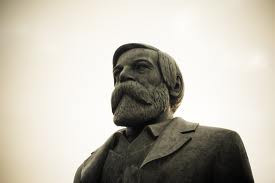Review: The Frock-Coated Communist by Tristram Hunt
To introduce this article with a reference to Engels as Marx’s right hand man is to do this biography – and indeed the memory of Engels – a great injustice. Unfortunately, such is the image handed down to us from history. Engels, very much a political firebrand in his own right, will forever be regarded as Marx’s sidekick. The great irony being that this is just how Engels would have liked to be remembered: the ‘second fiddle’ to Marx’s genius.
Engels was a Victorian cotton magnate, a raffish, high-living, fox-hunting gentleman who enjoyed lobster, champagne and women. Needless to say, not what one might expect in a writer whose life was dedicated to scientific socialism. And yet from this writer stems a body of work dedicated to the lives of the poor, a school of socialist feminism and a methodology of historical inquiry.
Starting with his precocious childhood, Hunt charts the intriguing story of Engels’ life from daddy’s little rebel to world-changing philosopher. Perhaps the most interesting section of the work – which reads like a narrative – is the sacrifice Engels made, a self-loathing life as a factory owner so he could fund his dear friend’s burning critique of the very system that kept him alive. As Hunt claims, ‘Heroically, between 1850 and 1870 Engels sacrificed much of what gave him meaning in life – intellectual inquiry, political activism, his close friendship with Marx – to serve the cause of scientific socialism’ .
Such is the nature of the Soviet legacy that ‘Marx’ has become a dirty word, as have many others – not least ‘Engels’ – in today’s society. Hunt rightly points out that it was dialectical materialism, a terrain over which Engels reigned supreme, rather than a theory of surplus value, one of Marx’s main contributions in Das Kapital, that drove the Soviet-led communist movement and all of the atrocities committed thereby. As such, an interesting question is raised: ‘_was Engels responsible for the terrible deeds carried out under Marxism-Leninism?_’ As one reads the book this uneasy question is in the back of one’s mind until Hunt gives his emphatic answer: no, he isn’t. ‘_In no intelligible sense_’, Hunt claims, ‘_can Engels or Marx bear culpability for the crimes of these historical actors carried out generations later, even if the policies were offered up in their honour_’.
It is remarkable how few of Marx and Engels’ critics (or perhaps more accurately those who scoff at their theory as ‘unrealistic’) pay them the respect of reading their work. This biography, as the title promises, tells the story of a man’s life who, like the theory he fostered, is governed by contradiction.
I have put far too much emphasis on a hostile, defensive style than I would have liked. Although the question of Engels’ legacy is an important one, it is not by any means the reason for this book; it is an afterthought at best. The book manages to maintain a distant style throughout; enough distance for academic authority, but still able to endear.
It is a beautifully written, incredibly readable and moving account of friendship, whatever the reader’s political persuasion.
The Frock-Coated Communist: Life and Times of the Original Champagne Socialist by Tristram Hunt was published in 2010.

Comments